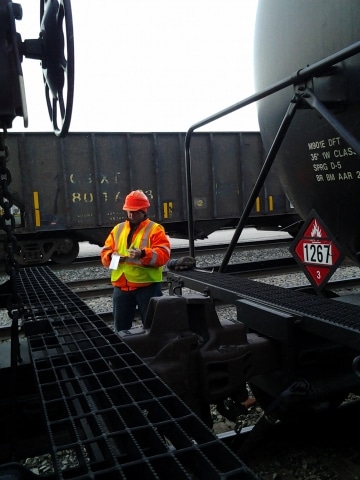Two years ago, trains snaked through American towns and cities day and night often without residents, or even city officials, knowing they were carrying explosive crude oil from the Bakken shale fields in North Dakota.
But now — after four serious oil train explosions in the US and Canada — the issue has exploded into public consciousness, with citizens and governments across the country raising questions about whether it’s safe to transport the flammable or explosive petroleum products through residential neighborhoods.
Recently we have seen some major developments in the national discussion about moving oil by rail in the United States.
Yesterday, U.S. Transportation Secretary Anthony Foxx told Congress that his agency is committed to pressing the oil-by-rail industry to come up with a safer tank car design for unconventional oil. “My target date is as soon as possible,” Foxx said, although he would not commit to a hard deadline for stricter standards when pressed by the Senate Appropriations committee.
As more communities learn about the dangers of the Bakken crude oil traveling through their neighborhoods by train, they are taking a stand and saying they don’t want it. Additionally, communities targeted for new oil-by-rail projects are fighting these new projects.
In Albany, N.Y., where 150,000 barrels of Bakken crude arrive by rail every day, the state’s Department of Environmental Conservation sent a letter to Global Partners, one of the two companies bringing the oil to Albany, requesting much more information from Global about its plans to expand its oil processing facility at the Port of Albany. Additionally, in a move that was well received by local activists, the department stated that all of the permits granted to allow the transport of oil by rail in Albany are under review.
That same week, Global was fined for its operations on the West coast, where the Oregon Department of Environmental Quality (DEQ) found that Global was bringing in 300 million gallons of oil when it was only permitted for 50 million gallons. In an unusual move, the department scheduled a public comment period on April 3rd, to allow residents to comment on this already permitted project.
As in Albany, the initial project was approved without the knowledge or input of local residents, as noted by Brett VandenHeuvel, executive director of Columbia Riverkeeper, speaking to The Oregonian:
“I find it deeply disturbing that DEQ knew about this, didn’t take action sooner and didn’t inform the public. To skirt that whole process is bad public policy and bad government.”
In late March, the Berkeley, California city council voted unanimously to oppose plans by Phillips 66 to transport oil by rail through the city.
In New York, Governor Andrew Cuomo issued another report on new safety inspections.
“The state is continuing proactive inspections to protect New Yorkers and prevent crude oil accidents,” Cuomo said. “Our preparedness and response plans must be adequate ahead of time — not after tragedy strikes. We have seen too many crude oil disasters, and with continued comprehensive safety and emergency response reviews and efforts to improve federal policies and regulation, we can help ensure that New York is doing everything possible to prevent mishaps and keep crude oil transport safe.”
Last month, it was reported that environmental groups in Richmond, CA are suing regarding the permit that was granted to bring oil by rail to a transfer station in Richmond. As with the cases in New York and Oregon, the initial permit was granted without an environmental review or public notification or input. Andres Soto of Communities for a Better Environment noted the lack of public review when talking to the Contra Costa Times.
“We decided that we needed to file this lawsuit because it was a complete sign of disrespect to the people of Richmond on the part of air district staff to decide that this crude by rail project could move forward without any public review.”
In late March, Reuters reported the Department of Transportation is not pleased with the oil-by-rail industry’s lack of response to its requests for information pertaining to accidents with a spokeswoman for the department saying: “The overall and ongoing lack of cooperation is disappointing, slows progress and certainly raises concerns.”
Since the initial approval of many of these oil-by-rail projects, there have been warnings about the risks posed by the DOT-111 tank cars as well as the explosive nature of the Bakken crude oil which have alarmed the public. It appears there has been a turning point in this discussion and it seems unlikely that future oil-by-rail projects will ever fly under the radar the way they once did.
Image credit: Photo of rail inspections on New York Governor’s site.
Subscribe to our newsletter
Stay up to date with DeSmog news and alerts






